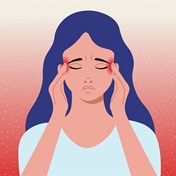Some people may be vulnerable to developing severe headaches when the temperature climbs or atmospheric pressure drops, a new study suggests.
People who suffer migraines or other types of debilitating headaches commonly cite weather changes as a trigger of head pain. But studies on the matter have come to conflicting conclusions.
These latest findings, reported in the journal Neurology, are from a relatively large study - more than 7 000 patients seen in one Boston emergency room for severe headaches over a 7-year period.
Risk increase with changing temperature
Researchers found that the risk of migraine and non-migraine headaches tended to climb along with temperature - increasing by 7.5% for every 5-degree Celsius increase in temperature. The trend was seen during warm and cold months alike, the study found.
Similarly, the risk of non-migraine headache increased during the 2 to 3 days following a drop in barometric pressure. Low barometric pressure generally means cloudy skies and storms, while high pressure means clear skies.
No one knows why temperature spikes and pressure dips might contribute to headaches, lead researcher Dr Kenneth J. Mukamal, of Beth Israel Deaconess Medical Centre in Boston, told Reuters Health.
Physiological effects of environment
"We know there are a lot of physiological effects of environment, including changes in blood pressure and nerve function," he explained, "but how those directly translate into headache is less clear."
While the study suggests that weather changes may indeed be a headache trigger, it found no strong evidence that air pollution is - as some small studies have reported.
No link between pollution, headaches
Using data on daily air pollution concentrations in Boston, the researchers found no clear connection between air quality and ER visits for headaches. There was, however, some evidence that non-migraine headaches were associated with one particular pollutant, nitrogen dioxide.
"More generally," Mukamal said, "we need much larger studies to examine air pollution well." A larger study, he noted, might detect an effect of air pollution where this one could not.
Headache sufferers may not be able to change the weather, but the findings could still have practical implications, according to Mukamal. When doctors have patients keep headache "diaries" to help pinpoint their triggers, they might do well to include information about their environment - including weather - and not only behavioural factors like sleep habits and diet. – (Amy Norton/Reuters Health, March 2009)
SOURCE: Neurology, March 10, 2009.
Read more:
A migraine in the forecast
Warm weather can trigger migraines




 Publications
Publications
 Partners
Partners










